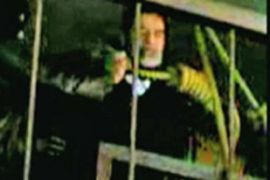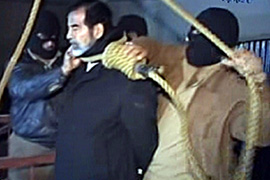Video shows Saddam being taunted
Saddam is buried in Awja and new footage emerges of his execution.

“God damn you,” a guard said.
“God damn you,” replied Saddam.
Saddam appeared to smile at those taunting him from below the gallows. He said they were not showing manhood.
Then Saddam began reciting the Shahada, a Muslim prayer that says there is no god but God and Muhammad is his messenger, according to an unabridged copy of the video clip, which was posted on a website.
Saddam made it to midway through his second recitation of the verse. His last word was Muhammad. Then the floor dropped out of the gallows.
Najib al-Nuaimi, a member of the defence team, told Al Jazeera on Sunday that no Sunni lawyer was allowed to be among the execution witnesses and that the conduct of those present showed it was an act of revenge and for political purposes.
“This is not in the normal procedures to execute a normal person,” he said.
“It’s full of hatred and it’s very ugly. It’s nothing to do with the Dujail case.”
By several accounts, Saddam was calm but scornful of his captors, engaging in a give-and-take with the crowd gathered to watch him die and insisting he was Iraq‘s saviour, not its tyrant and scourge.
Munir Haddad, an appeals court judge who witnessed the hanging, told the BBC: “He said we are going to heaven and our enemies will rot in hell and he also called for forgiveness and love among Iraqis but also stressed that the Iraqis should fight the Americans and the Persians.”
Another witness, national security adviser Mowaffak al-Rubaie, told The New York Times that one of the guards shouted at Saddam: “You have destroyed us. You have killed us. You have made us live in destitution.”
Al-Rubaie told the newspaper that Saddam responded: “I have saved you from destitution and misery and destroyed your enemies, the Persians and Americans.”
Burial
 |
| Saddam exchanged jibes with those at his execution [AFP] |
Ali al-Nida, head of the Albu Nasir tribe, said that the burial had taken place at 4am in a family plot in the village of Saddam’s birth.
Al Jazeera correspondent Hoda Abd al-Hamid said he was buried in a far corner, his grave covered with the Iraqi flag.
Saddam’s family had hoped to bury him in Ramadi, a symbolic site, but they were prevented from doing so due to security reasons.
Armed groups killed at least seven people, including three Iraqi soldiers, a day after Saddam’s execution.
A group of gunmen in vehicles attacked an Iraqi army checkpoint in Hawijah, west of the northern oil hub of Kirkuk, killing three soldiers and wounding another two, local police said.
Four more people were killed in several attacks in Baghdad.
Two were killed and another two wounded when an armed group fired a Katyusha rocket in the capital’s northwest Shia district of Kadhimiyah where Saddam was hanged.
Another Iraqi was killed and six others wounded in a car bomb attack in the northern neighbourhood of Hurriyah, a day after 37 people died in a triple car bomb attack in the same area.
In yet another attack, one person was killed and five wounded in a car bomb explosion in the Shawaqha neighbourhood in Baghdad.
Al-Maliki, his fragile authority among fellow Shia significantly enhanced after he forced through Saddam’s execution over Sunni and Kurdish hesitation, reached out to Saddam’s Sunni followers.
| Your Views |
|
“This will only be a catalyst for more violence” Skyclad Awen, Edmonton, Canada |